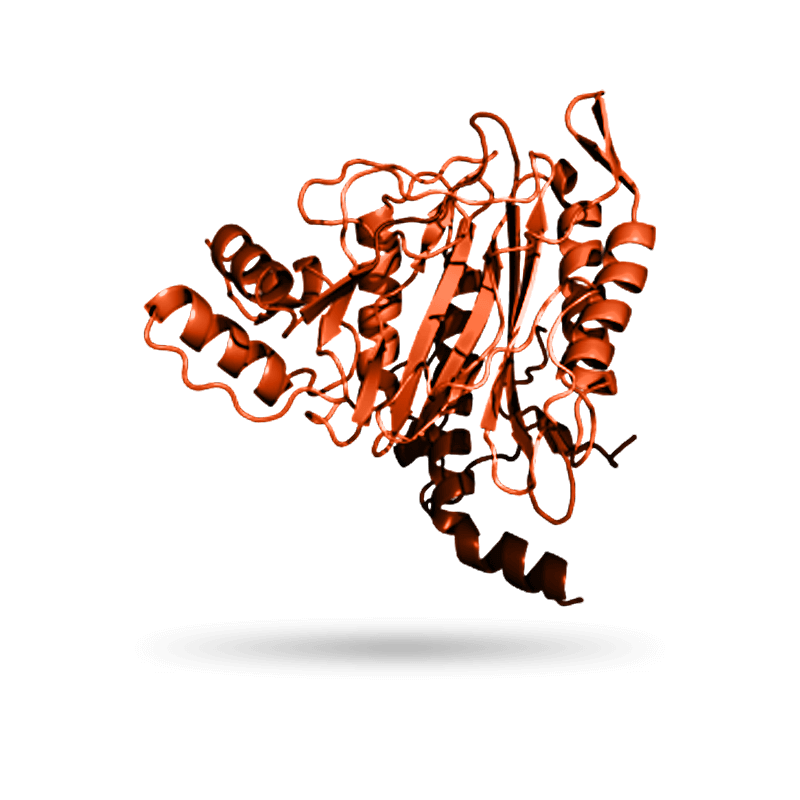MetAP2 – Validated in Cancer and in Obesity
Methionine aminopeptidase type II (MetAP2) — an enzyme in the metalloprotease class — is the target for SynDevRx’s lead compound evexomostat (SDX-7320). MetAP2 biology is complex, as it has a number of exclusive substrates specific to MetAP2, each of which is impacted in unique ways upon MetAP2 inhibition.
The primary role of MetAP2 is to remove the initiator methionine residue from newly-formed proteins. Methionine removal is required for subsequent post-translational modification of its substrates that regulate many cellular processes, including:
- Hypoxic response
- Angiogenesis (the development of new blood vessels)
- Cell proliferation
- Turnover of specific proteins
Targeting MetAP2 as a combination strategy with other treatment modalities could potentiate those treatments by making the tumor mircoenvironment more receptive to cytotoxic drugs and immunotherapy.

Why Target MetAP2?
Independent academic and clinical research has implicated elevated levels of MetAP2 as a key mediator in multiple diseases related to hypoxia, angiogenesis and chronic inflammation, including:
- Many types of cancer
- Morbid obesity
- Rheumatoid arthritis (Brahn 2009) (via an anti-angiogenic approach using a fumagillin-class MetAP2 inhibitor)
- Eye diseases (e.g., uveitis, age-related macular degeneration)
In 1997, MetAP2 was identified as the cellular target of fumagillin-class molecules. At SynDevRx, we designed our lead compound to apply the combined, clinically-established beneficial effects of MetAP2 inhibition — anti-tumor, anti-metabolic and anti-angiogenic — while avoiding the safety challenges typical of small-molecule fumagillin derivatives.
Cancer
MetAP2 has been shown to be upregulated in many cancers compared with normal tissues (Tucker 2008). Clinical studies of small-molecule fumagillin derivatives have demonstrated anti-tumor activity, though toxicity challenges (particularly neurotoxicity) prevented further development of these compounds (Tran 2004) (Kudelka 1998) (Bhargava 1999).
In a Phase 1 study of SDX-7320 in heavily pre-treated cancer patients with solid tumors, SDX-7320 showed potent anti-angiogenic, anti-metabolic activity with reductions in tumor metastases and stable disease.
Metabolic Dysfunction
Metabolic dysfunction (which is typical in overweight and obese people) has been shown to predispose people to get certain types of cancer (Lohmann 2016), and cancer patients who are overweight or obese have higher cancer mortality rates than their metabolically normal counterparts (Calle 2003) (LaubySecretan 2016). MetAP2 inhibition has been clinically shown to improve regulation of key metabolic hormones known to stimulate cancer cell proliferation, migration and metastasis.
Angiogenesis
MetAP2 has been shown to play a key role in angiogenesis, which tumors need to grow and spread. Inhibition of angiogenesis is a validated strategy for the treatment of cancer. For example, drugs such as bevacizumab (Avastin®), aflibercept (Zaltrap®) and ramucirumab (Cyramza ®) target angiogenesis by interfering with vascular endothelial growth factor (VEGF) signaling. The fungal metabolite fumagillin and its structural analogs have also been shown to exert anti-angiogenic effects through the selective and irreversible inhibition of MetAP2 (Satchi-Fainaro 2004) (Zhang 2000).
